Ramteja Sajja
Evaluating AI-Powered Learning Assistants in Engineering Higher Education: Student Engagement, Ethical Challenges, and Policy Implications
Jun 06, 2025Abstract:As generative AI tools become increasingly integrated into higher education, understanding how students interact with and perceive these technologies is essential for responsible and effective adoption. This study evaluates the use of the Educational AI Hub, an AI-powered learning framework, in undergraduate civil and environmental engineering courses at a large R1 public university. Using a mixed-methods approach that combines pre- and post-surveys, system usage logs, and qualitative analysis of the open-ended prompts and questions students posed to the AI chatbot, the research explores students' perceptions of trust, ethical concerns, usability, and learning outcomes. Findings reveal that students appreciated the AI assistant for its convenience and comfort, with nearly half reporting greater ease in using the AI tool compared to seeking help from instructors or teaching assistants. The tool was seen as most helpful for completing homework and understanding course concepts, though perceptions of its instructional quality were mixed. Ethical concerns emerged as a key barrier to full engagement: while most students viewed AI use as ethically acceptable, many expressed uncertainties about institutional policies and apprehension about potential academic misconduct. This study contributes to the growing body of research on AI in education by highlighting the importance of usability, policy clarity, and faculty guidance in fostering meaningful AI engagement. The findings suggest that while students are ready to embrace AI as a supplement to human instruction, thoughtful integration and transparent institutional frameworks are critical for ensuring student confidence, trust, and learning effectiveness.
An Open-Source Dual-Loss Embedding Model for Semantic Retrieval in Higher Education
May 08, 2025Abstract:Recent advances in AI have catalyzed the adoption of intelligent educational tools, yet many semantic retrieval systems remain ill-suited to the unique linguistic and structural characteristics of academic content. This study presents two open-source embedding models fine-tuned for educational question answering, particularly in the context of course syllabi. A synthetic dataset of 3,197 sentence pairs, spanning synonymous terminology, paraphrased questions, and implicit-explicit mappings, was constructed through a combination of manual curation and large language model (LLM)-assisted generation. Two training strategies were evaluated: (1) a baseline model fine-tuned using MultipleNegativesRankingLoss (MNRL), and (2) a dual-loss model that combines MNRL with CosineSimilarityLoss to improve both semantic ranking and similarity calibration. Evaluations were conducted on 28 university course syllabi using a fixed set of natural language questions categorized into course, faculty, and teaching assistant information. Results demonstrate that both fine-tuned models outperform strong open-source baselines, including all-MiniLM-L6-v2 and multi-qa-MiniLM-L6-cos-v1, and that the dual-loss model narrows the performance gap with high-performing proprietary embeddings such as OpenAI's text-embedding-3 series. This work contributes reusable, domain-aligned embedding models and provides a replicable framework for educational semantic retrieval, supporting downstream applications such as academic chatbots, retrieval-augmented generation (RAG) systems, and learning management system (LMS) integrations.
Enhancing Collective Intelligence in Large Language Models Through Emotional Integration
Mar 05, 2025Abstract:This research investigates the integration of emotional diversity into Large Language Models (LLMs) to enhance collective intelligence. Inspired by the human wisdom of crowds phenomenon, where group decisions often outperform individual judgments, we fine-tuned the DarkIdol-Llama-3.1-8B model using Google's GoEmotions dataset and Low-Rank Adaptation (LoRA) to simulate emotionally diverse responses. Evaluating the model on a distance estimation task between Fargo, ND, and Seattle, WA, across 15,064 unique persona configurations, we analyzed how emotional states and social attributes influence decision-making. Our findings demonstrate that emotional integration shapes response patterns while maintaining acceptable prediction accuracy, revealing its potential to enhance artificial collective intelligence. This study provides valuable insights into the interplay of emotional diversity and decision-making in LLMs, suggesting pathways for creating emotionally aware AI systems that balance emotional depth with analytical precision.
Integrating Generative AI in Hackathons: Opportunities, Challenges, and Educational Implications
Feb 01, 2024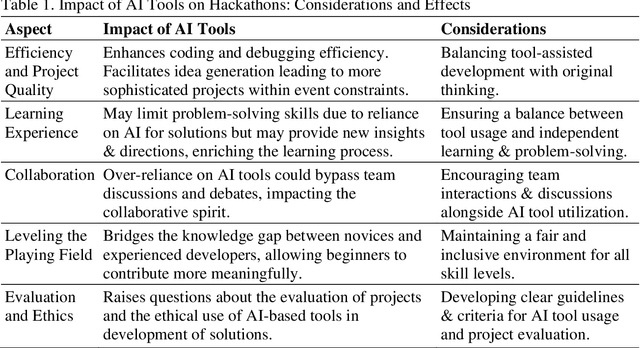
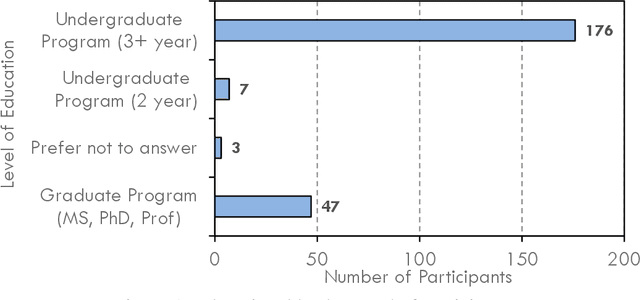

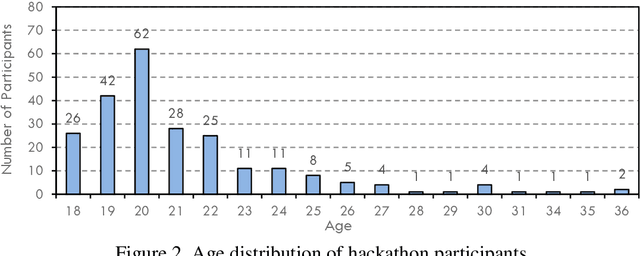
Abstract:Hackathons and software competitions, increasingly pivotal in the software industry, serve as vital catalysts for innovation and skill development for both organizations and students. These platforms enable companies to prototype ideas swiftly, while students gain enriched learning experiences, enhancing their practical skills. Over the years, hackathons have transitioned from mere competitive events to significant educational tools, fusing theoretical knowledge with real-world problem-solving. The integration of hackathons into computer science and software engineering curricula aims to align educational proficiencies within a collaborative context, promoting peer connectivity and enriched learning via industry-academia collaborations. However, the infusion of advanced technologies, notably artificial intelligence (AI), and machine learning, into hackathons is revolutionizing their structure and outcomes. This evolution brings forth both opportunities, like enhanced learning experiences, and challenges, such as ethical concerns. This study delves into the impact of generative AI, examining its influence on student's technological choices based on a case study on the University of Iowa 2023 event. The exploration provides insights into AI's role in hackathons, and its educational implications, and offers a roadmap for the integration of such technologies in future events, ensuring innovation is balanced with ethical and educational considerations.
Integrating AI and Learning Analytics for Data-Driven Pedagogical Decisions and Personalized Interventions in Education
Dec 15, 2023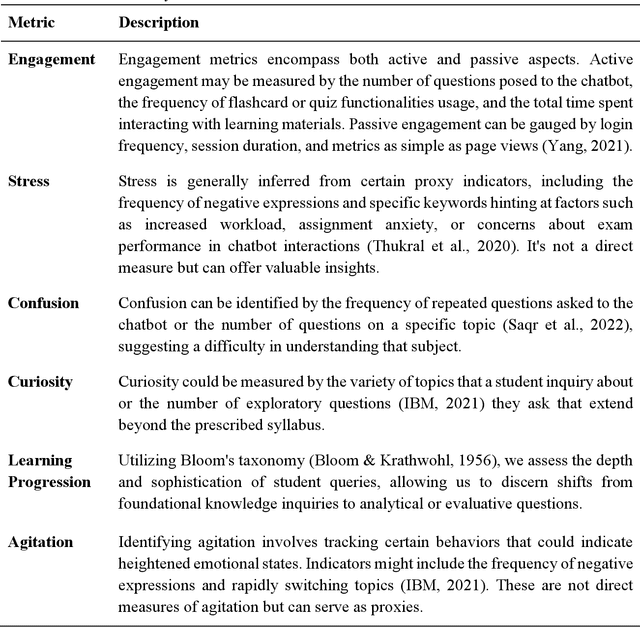
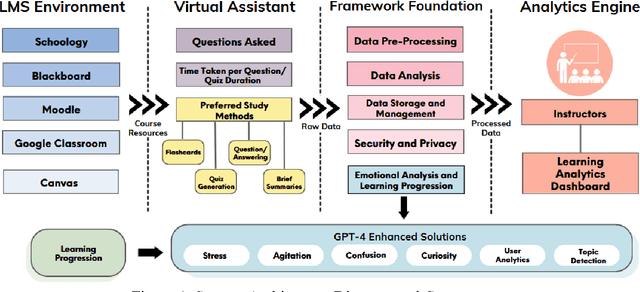
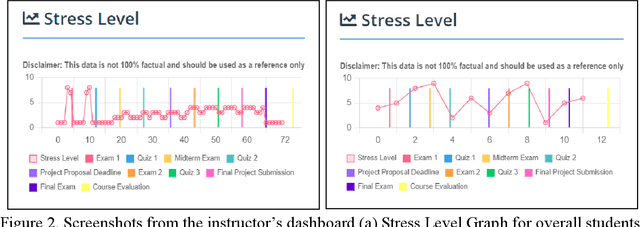
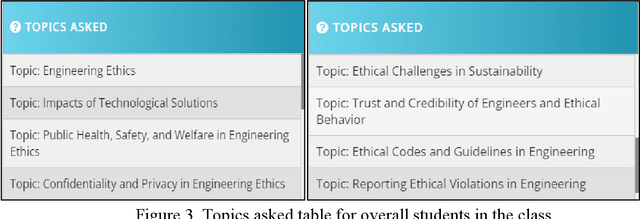
Abstract:This research study delves into the conceptualization, development, and deployment of an innovative learning analytics tool, leveraging the capabilities of OpenAI's GPT-4 model. This tool is designed to quantify student engagement, map learning progression, and evaluate the efficacy of diverse instructional strategies within an educational context. Through the analysis of various critical data points such as students' stress levels, curiosity, confusion, agitation, topic preferences, and study methods, the tool offers a rich, multi-dimensional view of the learning environment. Furthermore, it employs Bloom's taxonomy as a framework to gauge the cognitive levels addressed by students' questions, thereby elucidating their learning progression. The information gathered from these measurements can empower educators by providing valuable insights to enhance teaching methodologies, pinpoint potential areas for improvement, and craft personalized interventions for individual students. The study articulates the design intricacies, implementation strategy, and thorough evaluation of the learning analytics tool, underscoring its prospective contributions to enhancing educational outcomes and bolstering student success. Moreover, the practicalities of integrating the tool within existing educational platforms and the requisite robust, secure, and scalable technical infrastructure are addressed. This research opens avenues for harnessing AI's potential in shaping the future of education, facilitating data-driven pedagogical decisions, and ultimately fostering a more conducive, personalized learning environment.
Artificial Intelligence-Enabled Intelligent Assistant for Personalized and Adaptive Learning in Higher Education
Sep 19, 2023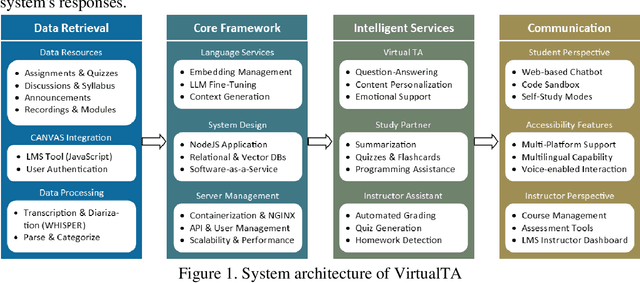
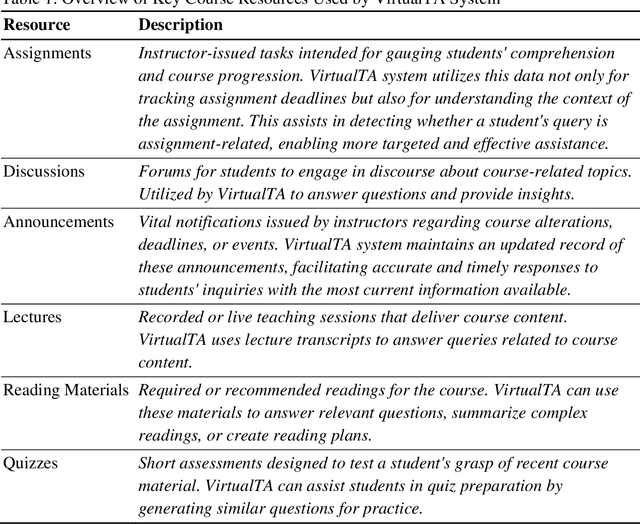

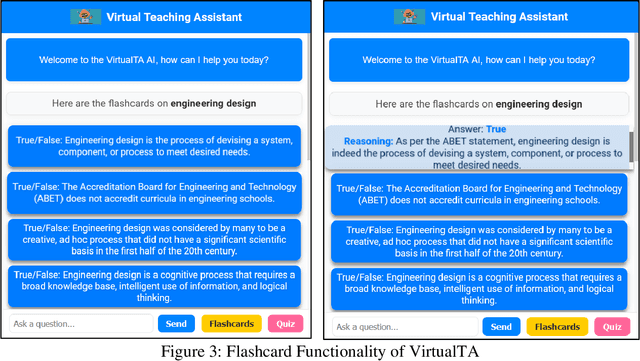
Abstract:This paper presents a novel framework, Artificial Intelligence-Enabled Intelligent Assistant (AIIA), for personalized and adaptive learning in higher education. The AIIA system leverages advanced AI and Natural Language Processing (NLP) techniques to create an interactive and engaging learning platform. This platform is engineered to reduce cognitive load on learners by providing easy access to information, facilitating knowledge assessment, and delivering personalized learning support tailored to individual needs and learning styles. The AIIA's capabilities include understanding and responding to student inquiries, generating quizzes and flashcards, and offering personalized learning pathways. The research findings have the potential to significantly impact the design, implementation, and evaluation of AI-enabled Virtual Teaching Assistants (VTAs) in higher education, informing the development of innovative educational tools that can enhance student learning outcomes, engagement, and satisfaction. The paper presents the methodology, system architecture, intelligent services, and integration with Learning Management Systems (LMSs) while discussing the challenges, limitations, and future directions for the development of AI-enabled intelligent assistants in education.
Platform-Independent and Curriculum-Oriented Intelligent Assistant for Higher Education
Feb 15, 2023Abstract:Miscommunication and communication challenges between instructors and students represents one of the primary barriers to post-secondary learning. Students often avoid or miss opportunities to ask questions during office hours due to insecurities or scheduling conflicts. Moreover, students need to work at their own pace to have the freedom and time for the self-contemplation needed to build conceptual understanding and develop creative thinking skills. To eliminate barriers to student engagement, academic institutions need to redefine their fundamental approach to education by proposing flexible educational pathways that recognize continuous learning. To this end, we developed an AI-augmented intelligent educational assistance framework based on a power language model (i.e., GPT-3) that automatically generates course-specific intelligent assistants regardless of discipline or academic level. The virtual intelligent teaching assistant (TA) system will serve as a voice-enabled helper capable of answering course-specific questions concerning curriculum, logistics and course policies. It is envisioned to improve access to course-related information for the students and reduce logistical workload for the instructors and TAs. Its GPT-3-based knowledge discovery component as well as the generalized system architecture is presented accompanied by a methodical evaluation of the system accuracy and performance.
 Add to Chrome
Add to Chrome Add to Firefox
Add to Firefox Add to Edge
Add to Edge